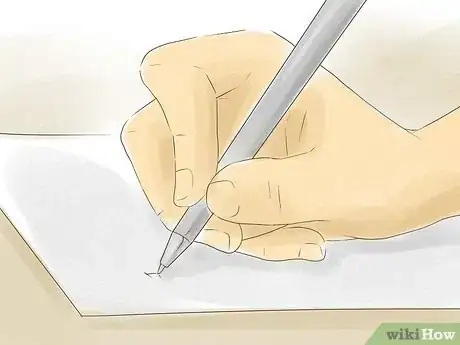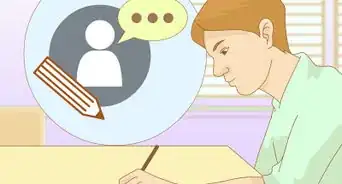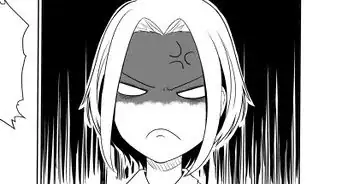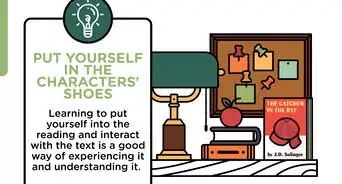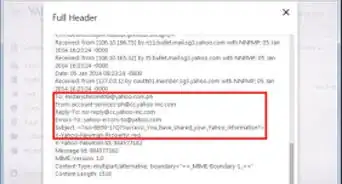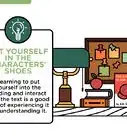This article was co-authored by Michelle Golden, PhD. Michelle Golden is an English teacher in Athens, Georgia. She received her MA in Language Arts Teacher Education in 2008 and received her PhD in English from Georgia State University in 2015.
wikiHow marks an article as reader-approved once it receives enough positive feedback. In this case, 86% of readers who voted found the article helpful, earning it our reader-approved status.
This article has been viewed 75,783 times.
Classic literature includes older works that have withstood the test of time and that are still widely read today. Some well-known examples of classic literature include The Aeneid by Virgil, The Odyssey by Homer, Inferno by Dante, and Romeo and Juliet by William Shakespeare. Whether you're a student or just an avid reader hoping to delve into classic literature, you may be wondering where to begin. Familiarizing yourself with a text before you read, using reading strategies to improve your understanding, and finding ways to reflect on the text can all help you to understand a work of classic literature.
Steps
Familiarizing Yourself with the Text
-
1Read summaries of what the work is about. You can find descriptions or summaries of classic works of literature online, or read the back cover of the book to gain a basic idea of what the story is about. Knowing a bit about the plot, characters, and setting may make it easier for you to follow and understand the writing when you begin reading.
- Just make sure that you do not substitute summaries for reading the actual text. Remember that a summary is someone else’s interpretation of what happened. Even if the summary is quite objective, it may contain some bias about character motives and potential meanings behind events.
-
2Learn about a book's historical period. Understanding the time period in which a book was written can either help or hinder how you read that book.[1] By researching the historical events that are depicted in the book or otherwise influenced its writing, you can come away with a better understanding of that novel's narrative.
- You can get a quick understanding of a given time period and/or the author's life experiences by searching online.
Advertisement -
3Consider skimming. You can also skim a book or other work of classic literature if reading it seems too hard. Skimming will help you to gain a basic understanding of the plot, characters, setting, and concepts.
- Read the first and last paragraph of each chapter to get a sense of what happens on the pages within.
- Read the first and last sentence of each paragraph to get a sense of what happens in that chapter.
-
4Ask questions. If you know someone who has already ready this piece of classic literature, then asking him or her some basic questions may help you. You could ask the person to give you a basic explanation of the:
- Characters - the people (and sometimes animals) in a work of fiction.
- Setting - the place, time, and culture in which a novel takes place.
- Plot - the things that take place over the course of the novel.
- Theme - the underlying concept, idea, or belief that runs through the entire novel.
- Conflict - a struggle that creates tension in the novel.
- Climax - turning point at which the tension (created by conflict) cannot rise anymore and must be resolved.
- Narrator - who tells the story (a character in the story or someone else?).
Improving Your Understanding
-
1Consider reading an annotated edition. Many classic texts were written with a vocabulary or historical context that may be lost on contemporary readers. Reading an annotated version, which includes supplemental information and explanations, is an easy way to engage with an otherwise complicated text.
- In addition to reading an annotated text, try keeping a dictionary or reader's guide on hand when you read. These supplemental materials can help you work through difficult terms and confusing chapters.
-
2Start reading and keep reading. Even if you struggle with the text, it is important to stick with it if you want to understand it. After sticking with it for a while, the language, setting, and characters may start to become more familiar to you.[2]
- If you encounter a difficult passage that you do not understand, mark the page and skip it for now. You can always come back to it after you have a basic understanding of the text.
- Skip footnotes on your first read because these may slow you down.
- Keep in mind that with difficult texts, it is often necessary to read through them more than once. After you have read through a piece of classic literature once, your second read through should be much easier and concepts that were confusing to you should make more sense.
-
3Make comments in the margins of the text. If you're trying to gain a better understanding of a difficult text, underlining passages may not be enough. Instead, try making comments in the margins to fully engage with the text. Your comments/notes can do any of the following to help you gain a better understanding of the material:
- summarize the attached passages
- make notes on passages that relate to other passages from earlier/later in the text
- write (and answer) questions on anything you didn't understand
- agree or disagree with what a passage is saying
-
4Try reading and learning with a group. Some readers learn better while working within a group setting. Joining a book club or enrolling in a literature class at your local community college can give you the opportunity to discuss a novel with other readers and gain valuable insight from an instructor.
- You can find book clubs in your area by searching online.
- If you're not able to enroll in a class at your local college, you may want to consider taking a massive open online course (MOOC). These courses are often free or very affordable and are frequently offered through prestigious educational institutions.
Reflecting On What You Have Read
-
1Write a summary or summaries. After you finish the text or finish a chapter, commit to writing a brief summary of everything important that happened. Restrict yourself to about a half page or less, and make sure you address the major plot points, how those points affected each character, and how that chapter fits into the context of the larger book.
- Write your chapter summaries without consulting the text or your notes. This will help test your understanding of what you've read.[3]
-
2Tell someone about what you have read. Telling something about something you have learned is a good way to help you understand t better yourself. If you have a friend who also has an interest in classic literature, then you might consider telling him or her about the text.
- Even if you have not yet finished reading a text, you may benefit from describing what has happened so far in your own words.
-
3Watch a film adaptation. For many readers, visualizing the characters, setting, and plot points of a book make it easier to absorb the narrative.[4] While watching a movie is not a substitute for reading the actual book, it may help you arrive at a better understanding of the book.
- For example, if you are reading a play by Shakespeare, then check out a filmed version of the play. While some versions use creative staging and may cut some of the dialogue, you will still be able to see most of the text come to life.
-
4Read commentary and critical analyses of the book online. After you finish reading, it may be useful to learn about what others have learned and interpreted from the text. Go online and see if websites such as Spark Notes and Cliffs Notes have any valuable information on your book. These often have information on themes, symbols, characters, and more, which may help you think about the book on a deeper level.
References
- ↑ http://bookhaven.stanford.edu/2012/12/enjoy-les-miserables-but-please-get-your-history-straight-first/
- ↑ http://www.reachoutmichigan.org/learn/readbook.html
- ↑ https://www.dartmouth.edu/~acskills/docs/sq3r_method.doc
- ↑ http://www.edutopia.org/blog/brain-movies-visualize-reading-comprehension-donna-wilson








